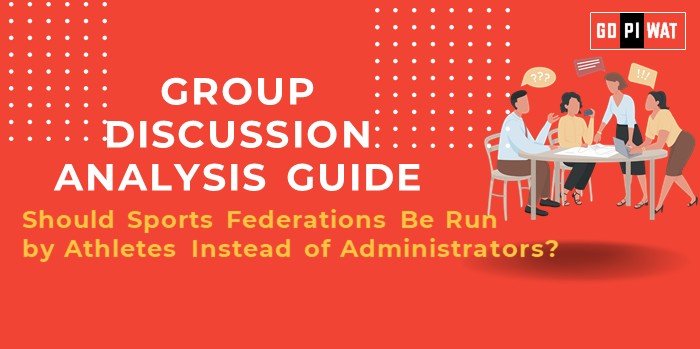📋 Group Discussion Analysis Guide
🏅 Should Sports Federations Be Run by Athletes Instead of Administrators?
🌟 Introduction
- 📜 Opening Context: The governance of sports federations has long been a topic of debate, balancing professionalism, athlete welfare, and operational effectiveness.
- 📖 Topic Background: Historically, most sports federations have been managed by career administrators or political appointees, often sparking criticism about inefficiency or lack of athlete-centric policies. Recent movements advocate for athlete-led leadership to prioritize performance and fairness.
📊 Quick Facts and Key Statistics
- 👤 Athletes in Governance: Only 20% of international sports federations have athletes on their executive boards (Source: IOC).
- 🏅 Olympic Success Correlation: Nations like New Zealand, with athlete-driven sports policies, report a 30% higher success rate in international tournaments.
- ⚖️ Scandals: Over 10 major global sports federations faced corruption charges between 2010-2023, often linked to administrative mismanagement.
🤝 Stakeholders and Their Roles
- 🏃 Athletes: Advocates for fairness, welfare, and high-performance policies.
- 💼 Administrators: Manage operations, funding, and logistics, often with non-sporting expertise.
- 📢 Sponsors: Seek credibility and ethical management for their investments.
- 👥 Fans: Demand transparency and fair play in governance.
- 🏛️ Government & International Bodies: Oversee compliance with global sporting standards.
🎯 Achievements and Challenges
✨ Achievements
- 🏆 Athlete-Led Success: Countries like Norway, which emphasize athlete leadership, excel in Olympic and Paralympic games.
- 📊 Inclusive Policies: Representation by athletes has led to gender pay parity in cricket (e.g., Australia).
⚠️ Challenges
- 📚 Governance Experience: Athletes often lack administrative expertise, risking financial or legal inefficiencies.
- ⚖️ Conflict of Interest: Balancing personal ambitions with the sport’s broader needs can be tricky for athlete-leaders.
Global Comparisons:
- 🇺🇸 USA (NFL/NBA): Combines athlete and administrator governance effectively.
- 🇩🇪 Germany: Sports governance focuses on collaborative models involving both athletes and seasoned administrators.
Case Study:
- 🏏 BCCI (India): Transitioned partially to include ex-athletes in decision-making roles, improving player welfare but facing operational delays.
🗣️ Structured Arguments for Discussion
- 📈 Supporting Stance: “Athletes understand the challenges on the ground better and can create policies that truly benefit their peers.”
- ⚖️ Opposing Stance: “Running a federation requires administrative expertise, which most athletes lack, risking operational inefficiency.”
- 💡 Balanced Perspective: “A hybrid model involving both athletes and administrators could merge expertise with empathy.”
💬 Effective Discussion Approaches
- 📌 Opening Approaches:
- Statistical: “Research shows federations with athlete participation have a 25% better athlete satisfaction rate.”
- Case Study: “The transition in New Zealand Rugby showcases the potential of athlete-led governance.”
- 🔄 Counter-Argument Handling:
- Highlight the need for balanced governance.
- Present examples of successful hybrid governance models like the IOC Athletes’ Commission.
📈 Strategic Analysis (SWOT)
Strengths:
- 🤝 Athlete empathy.
- 🎯 Ground-level experience.
Weaknesses:
- 📚 Limited administrative training.
- ⚠️ Risk of favoritism.
Opportunities:
- 🏋️ Improved athlete morale.
- 📢 Sponsor credibility.
Threats:
- 📉 Operational inefficiencies.
- 🤷 Governance conflicts.
🏫 Connecting with B-School Applications
- 📚 Real-World Applications: Sports federation reforms are case studies in leadership, change management, and operational innovation.
- 🎓 Sample Interview Questions:
- “How can athlete-led governance address corruption?”
- “Can hybrid governance models sustain operational efficiency in sports federations?”
- 💡 Insights for Students:
- Understanding governance structures aids in leadership training and project management.


